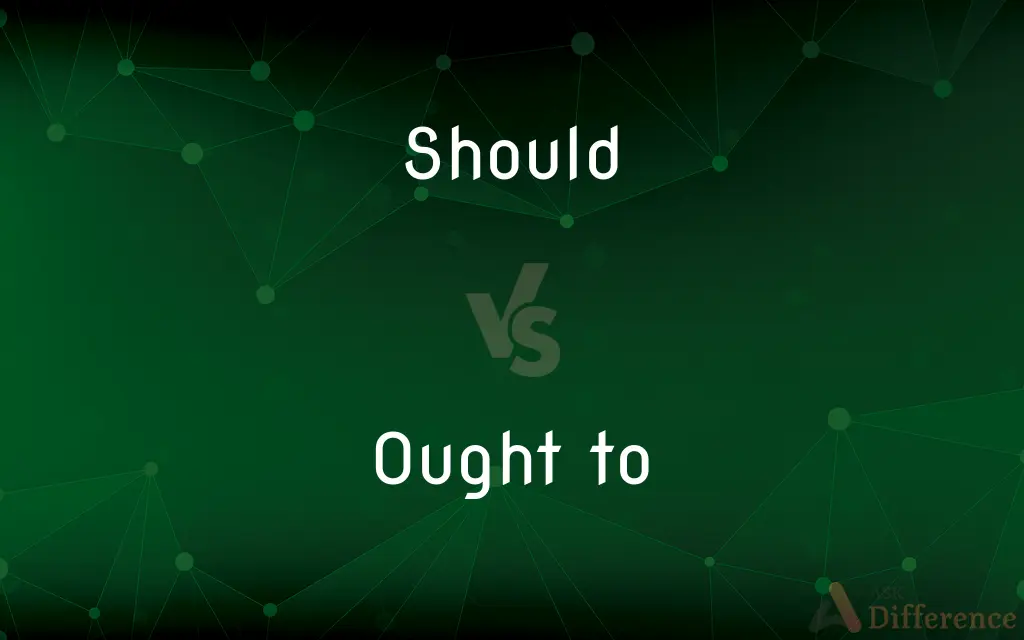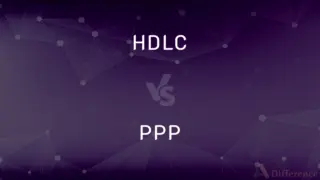Should vs. Ought to — What's the Difference?
By Tayyaba Rehman — Published on January 6, 2024
"Should" implies a recommendation, while "ought to" suggests moral duty. Both express advisability or duty.

Difference Between Should and Ought to
Table of Contents
ADVERTISEMENT
Key Differences
Should is widely used to express advisability or recommendations. It is a modal verb that is more common in everyday English. Should is often used to suggest what is appropriate or beneficial in a specific situation. It is flexible and can also indicate a degree of obligation or expectation.
Ought to shares similarities with should, conveying duty or correctness. It can sometimes carry a stronger moral implication than should. Ought to is also used to advise or make recommendations and is interchangeable with should in many contexts, but it is less commonly used in modern conversational English.
Using should in a sentence typically implies that there is a good reason to do something, but it is not necessarily a requirement. It is often used to give advice that is not forcefully binding. Should can suggest that there will be negative consequences if the advice is not followed, but it allows for discretion.
Ought to, while similar in meaning to should, can imply a stronger sense of duty or correctness. It often reflects an ethical dimension, suggesting that the action is the right thing to do. Ought to can sound slightly more formal or old-fashioned compared to should.
The choice between should and ought to can sometimes be influenced by regional preferences. In some English-speaking areas, ought to might be more commonly used than in others. However, the difference in use is often a matter of personal or stylistic choice rather than a strict rule.
ADVERTISEMENT
Comparison Chart
Formality
Less formal, more commonly used in everyday language.
More formal, less commonly used in conversational English.
Strength of Obligation
Implies advice or a recommendation.
Suggests a stronger moral obligation or duty.
Usage Frequency
More frequently used.
Less frequently used.
Negative Form
Should not (shouldn't).
Ought not to (oughtn't to), less common.
Historical Use
Has been used interchangeably with ought to.
Historically used with 'to', now more fixed.
Compare with Definitions
Should
Expression of advisability
You should wear a helmet while biking.
Ought to
Expectation or assumption
He ought to have reached home by now.
Should
Expectation
They should arrive by 9 PM, considering the traffic.
Ought to
Strong recommendation
You ought to apologize for what you did.
Should
Possibility or likelihood
It should rain tomorrow according to the forecast.
Ought to
Moral duty
You ought to tell the truth.
Should
Recommendation
You should try the new Italian restaurant downtown.
Ought to
Advisability
You ought to see a doctor about that cough.
Should
(auxiliary) Ought to; indicating opinion, advice, or instruction, about what is required or desirable.
Ought to
Logical conclusion
With that much practice, you ought to improve quickly.
Should
Used to issue an instruction (traditionally seen as carrying less force of authority than alternatives such as 'shall' or 'must').
You should never drink and drive.
The law is clear that you should always wear a seat belt.
The manual says that this switch should be in the 'off' position.
Should
Used to give advice or opinion that an action is, or would have been, beneficial or desirable.
You should go and see that film. I think you'll enjoy it.
I should exercise more often, but I’m too lazy.
She should not have been so rude.
Should
(informal) With verbs such as 'see' or 'hear', usually in the second person, used to point out something remarkable in either a good or bad way.
You should see his new apartment. It's like a palace!
If you think her piano playing is bad, you should hear her sing!
Should
In questions, asks what is correct, proper, desirable, etc.
What do you think? What should I do?
Should
(auxiliary) Ought to; expressing expectation.
Should
Indicates that something is expected to have happened or to be the case now.
They should have finished by now; I'll call them to check.
My fruit trees should be in flower, but the cold spring has set them back.
Should
Will be likely to (become or do something); indicates a degree of possibility or probability that the stated thing will happen or be true in the future.
They should have it finished by Friday.
When you press this button, the pilot flame should ignite.
You should be warm enough with that coat.
Should
Used to form a variant of the present subjunctive, expressing a state or action that is hypothetical, potential, mandated, etc.
If I should be late, go without me.
Should you need extra blankets, you will find them in the closet.
The man demanded that he should be allowed entry.
I'm surprised that he should say that.
Should
(auxiliary) cap=1.
I told him that I should be busy tomorrow.
Should
(auxiliary) An alternative to would with first person subjects.
Should
Used to express a conditional outcome.
If I had not been so tired, I should have laughed heartily.
Should
Used to impart a tentative, conjectural or polite nuance.
I should imagine that they have arrived by now.
I should think you would apologize.
Should
Used to express what the speaker would do in another person's situation, as a means of giving a suggestion or recommendation.
It's disgraceful the way that they've treated you. I should write and complain.
Should
To make a statement of what ought to be true, as opposed to reality. en
Should
Something that ought to be the case as opposed to already being the case.
Should
Used as an auxiliary verb, to express a conditional or contingent act or state, or as a supposition of an actual fact; also, to express moral obligation (see Shall); e. g.: they should have come last week; if I should go; I should think you could go.
Should
Soft obligation
I should finish my report by Monday.
Common Curiosities
Is ought to outdated?
It's less common in modern speech but is still correct and used in formal contexts.
Can should and ought to be used to predict future events?
Yes, they can suggest the likelihood or expectation of future events.
Can should and ought to express certainty?
They typically express advisability or expectation, not certainty.
Do should and ought to require a verb after them?
Yes, they are followed by the base form of a verb.
Can should and ought to be used in questions?
Yes, they can be used to ask for or suggest advice.
Can I use should instead of must?
Should is less forceful than must, which conveys a requirement.
Are should and ought to always interchangeable?
In many contexts, yes, but ought to can carry a stronger moral implication.
How do I form the negative of should?
Add "not" to form "should not" or the contraction "shouldn't."
What is the past form of should and ought to?
Should does not change; "ought to" can be followed by "have" + past participle for the past.
Can I use should in a past tense context?
Yes, with "have" + past participle, it can express a past recommendation or expectation that did not happen.
Can should be omitted in certain constructions?
Yes, especially in informal speech, as in "You should (really) see this movie!"
How do I use ought to in the past tense?
Combine "ought to" with "have" + past participle to talk about past duties or expectations.
Is there a difference in use between American and British English?
Ought to is slightly more common in British English, but both are used in both variants.
What is the negative form of ought to?
"Ought not to," although less commonly used than "shouldn't."
Is there a difference in formality between should and ought to?
Ought to is considered more formal.
Share Your Discovery

Previous Comparison
HDLC vs. PPP
Next Comparison
Manganese Oxide vs. Manganese DioxideAuthor Spotlight
Written by
Tayyaba RehmanTayyaba Rehman is a distinguished writer, currently serving as a primary contributor to askdifference.com. As a researcher in semantics and etymology, Tayyaba's passion for the complexity of languages and their distinctions has found a perfect home on the platform. Tayyaba delves into the intricacies of language, distinguishing between commonly confused words and phrases, thereby providing clarity for readers worldwide.
















































